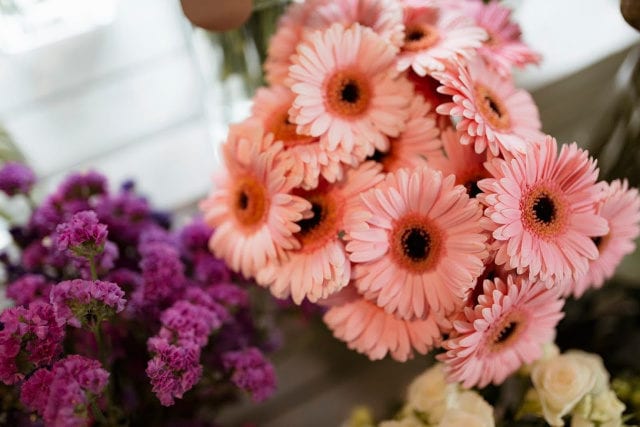Yep, sending flowers to a dear friend, a sick relative, or even bringing home a bouquet for yourself, can make you healthier.
Research shows over and over again that flowers impact us emotionally.
According to one study by the American Society for Horticulture Science, fresh flowers can not only lower feelings of stress and anxiety, but even ease your physical pain, too.
For some of us, that makes perfect sense, eh?
The study focused on whether plants had therapeutic qualities for surgical patients. 90 patients were divided up. Half were exposed to the flowers. The result? The patients surrounded by flowers experienced lower blood pressure; lower ratings of pain, anxiety, and fatigue; and even had reduced heart rates.
The results weren’t all physically based. The patients exposed to flowers reported higher positive emotions and higher overall satisfaction than those in rooms without blooms.

This study isn’t the only one to discover the benefits associated with plants and flowers. A growing body of research points to how flowers can positively impact your emotional well-being. One two-month study, in particular, used a survey to assess stress in women. The survey found 68 percent of people feel stress weekly, while 32 percent feel stress every day. Women are most stressed, with 25 percent saying they feel stressed out numerous times per day.
170 participants filled out the questionnaire, ages 18-65. Upon completion of the study, some were given fresh flowers, some were given a candle, and the remainder weren’t given anything for their participation. Of the three groups, the women that received the flowers reported a 5.5 point reduction of stress, based upon the final questionnaire, compared to just 2.0 points for the other two groups.
Alas, numerous studies hail the positive health and mental health impacts of both flowers and indoor plants and gardening in general.
Flowers: Other studies have shown having the scent of fresh-cut flowers in your home help you feel more relaxed and less stressed. The scent of lavender, for instance, is linked to helping you sleep better because it lowers your heart rate and blood pressure. There’s also research that has found the more time you spend around flowers, the more compassion you feel for others and yourself. Flowers are linked to helping you be more willing to help someone in need and those around fresh cut flowers have a tendency to enjoy their relationships more than those without flowers.
Indoor plants: Some studies show that indoor plants boost your memory and help with concentration. Plants oxygenate your indoor space which in turn boosts your brain cells.
Gardening: It combines physical activity with social interaction. You’re also exposed to nature and the sun. Exposure to the sun has shown reductions in blood pressure and increased vitamin D in the summer in particular. You’ll also feel more energized. Add in the vegetables and fruits you’re growing, which will add to a positive impact on your diet.
The bottom line?
Take the initiative and buy yourself some blooms for a refreshing change. Splurge, reward yourself. Flowers are another avenue for self-care to help boost your mood and your well-being.


